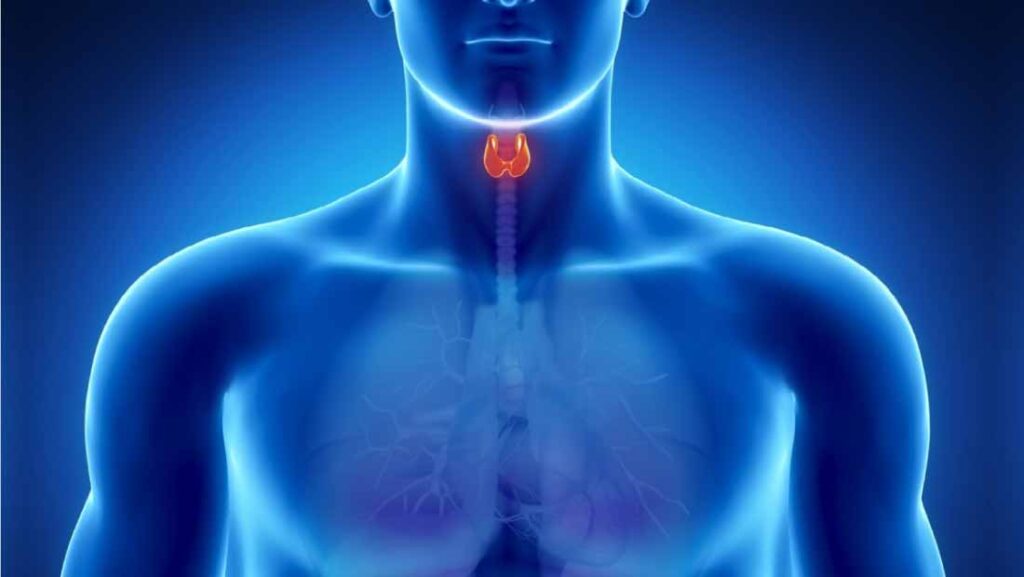Hyperthyroidism is a thyroid disorder in which the thyroid gland produces and releases excess thyroid hormones, causing an increase in the body’s metabolism. Thyroid hormones are responsible for controlling the rate at which the body uses energy, protein production, and tissue sensitivity to other hormones. When an excessive amount of thyroid hormones is produced, the metabolism speeds up, which can lead to a number of symptoms and disorders, such as weight loss, increased heart rate, anxiety, tremors, excessive sweating, muscle weakness, and fatigue. Hyperthyroidism can be caused by a variety of factors, including an overactive thyroid gland, autoimmune disease, hyperfunctioning thyroid nodules, thyroid tumors, thyroid inflammation, or excessive intake of thyroid hormones. Treatment for hyperthyroidism depends on the underlying cause and may include medications to reduce thyroid hormone production, radioactive iodine therapy to destroy overactive thyroid cells, or in some cases, surgery to remove the thyroid gland.
Aetiology
Hyperthyroidism can have several causes, including:
Graves’ disease: This is the most common cause of hyperthyroidism and occurs when the body’s immune system produces antibodies that stimulate the thyroid gland to overproduce thyroid hormones.
Hyperfunctioning thyroid nodules: Also known as thyroid adenomas, they are benign tumors in the thyroid gland that can produce and release excessive amounts of thyroid hormones.
Thyroiditis: This is inflammation of the thyroid gland that can release thyroid hormones stored in excess in the gland.
Thyroid hormone overtreatment: In some cases, hyperthyroidism can be caused by an excessive dose of thyroid hormones prescribed to treat hypothyroidism.
Thyroid gland tumors: Cancerous tumors of the thyroid gland can produce excess thyroid hormones.
Excessive iodine consumption: An excessive intake of iodine, either through diet or supplements, can stimulate the thyroid gland to overproduce thyroid hormones.
Rarely, hyperthyroidism can be caused by disorders of the pituitary gland or hypothalamus.
In general, the etiology of hyperthyroidism is complex and varies depending on each individual case. It is important for a qualified medical professional to determine the underlying cause of hyperthyroidism in order to provide adequate and effective treatment.
Clinical manifestations
The clinical manifestations of hyperthyroidism can vary depending on the cause, duration, and severity of the disorder, as well as the patient’s age and general health. Some of the most common signs and symptoms of hyperthyroidism include:
Unexplained weight loss
Increased appetite
Tachycardia or fast heartbeat
Heart palpitations
Excessive sweating
Heat intolerance
Tremors in the hands
Muscle weakness
Fatigue and general weakness
Nervousness and anxiety
Insomnia
Irritability
Changes in menstrual pattern
Difficulty concentrating
Hair loss
Bulging eyes or exophthalmos
Swelling at the base of the neck or goiter.
In some cases, hyperthyroidism may be asymptomatic or have mild, subtle symptoms, making it difficult to diagnose. If you experience any of these symptoms, especially if they occur acutely or if they are combined with other signs of illness, it is important to seek medical attention to get a proper diagnosis and effective treatment.
Diagnosis of Hyperthyroidism
The diagnosis of hyperthyroidism begins with a detailed clinical evaluation by a physician. During the evaluation, the doctor may ask about the symptoms you are experiencing, your medical history, family history, and any medications you are currently taking.
After clinical evaluation, one or more tests may be performed to confirm the diagnosis of hyperthyroidism. Tests may include:
Thyroid function tests: The levels of thyroid hormones in the blood are measured to determine if the thyroid gland is producing excess hormones.
Radioactive iodine uptake test: A small amount of radioactive iodine is given, and then the amount absorbed by the thyroid gland is measured. An excess in iodine absorption may indicate hyperthyroidism.
Thyroid ultrasound: Used to evaluate the size and shape of the thyroid gland and to detect the presence of nodules.
Thyroid biopsy: Used to evaluate a suspicious thyroid nodule, to determine if it is cancerous or not.
Eye exam: This is done to evaluate any inflammation or protrusion of the eye, which may indicate a thyroid-related condition.
It is important that the diagnosis of hyperthyroidism be made by a physician experienced in the management of thyroid disorders, as the symptoms of hyperthyroidism can be similar to those of other medical conditions, and an accurate diagnosis is critical for effective treatment.
Differential diagnosis
Differential diagnosis refers to the identification of other diseases that may exhibit symptoms similar to hyperthyroidism. Some of the conditions that can be confused with hyperthyroidism include:
Anxiety: Anxiety symptoms, such as excessive sweating, tremors, and tachycardia, can mimic the symptoms of hyperthyroidism.
Polycystic ovary syndrome: This hormonal condition can cause changes in menstrual pattern, acne, weight gain, and other symptoms that can be mistaken for those of hyperthyroidism.
Diabetes: Hyperglycemia in diabetes can cause excessive sweating, increased heart rate, and fatigue, which can be confused with hyperthyroidism.
Heart failure: Congestive heart failure can cause fatigue, increased heart rate, and shortness of breath, which can mimic the symptoms of hyperthyroidism.
Stimulant use: The use of stimulants, such as caffeine and illegal drugs, can cause symptoms similar to those of hyperthyroidism.
Addison’s disease: This condition can cause fatigue, weakness, and weight loss, which can be confused with the symptoms of hyperthyroidism.
It is important to make an accurate differential diagnosis in order to provide the appropriate treatment for each condition. Therefore, it is essential that an experienced medical professional conduct a thorough and detailed assessment of the patient’s symptoms before determining a diagnosis.
Hyperthyroidism Treatment
Treatment of hyperthyroidism depends on the underlying cause, severity of the condition, age, and overall health of the patient. Some of the most common treatments include:
Antithyroid medications: Antithyroid medications, such as methimazole and propylthiouracil, can stop excessive production of thyroid hormones and normalize thyroid function.
Radioactive iodine: Radioactive iodine is used to selectively destroy thyroid cells that produce excess hormones. This treatment may take several weeks to take effect.
Surgery: In severe cases of hyperthyroidism, the thyroid gland may be surgically removed to prevent excessive production of thyroid hormones.
Beta-blockers: Beta-blockers, such as propranolol, are used to control symptoms of hyperthyroidism, such as tachycardia and anxiety, while treating the underlying cause.
Importantly, all treatments for hyperthyroidism have potential side effects and associated risks, so they should be administered and supervised by a medical professional experienced in the management of thyroid diseases. In addition, long-term treatment may be necessary to adequately control thyroid function and prevent long-term complications.
Recent research
There is several recent investigations in the field of hyperthyroidism. Some of them are:
Identification of new susceptibility genes: Studies are underway to identify new genes that may be related to hyperthyroidism and increase susceptibility to the disease.
Combination therapies: Research is exploring the effectiveness of combinations of different types of therapies for hyperthyroidism, such as antithyroid therapy and radioactive iodine, in achieving a better response in patients who do not respond to a single treatment.
Low-dose radioactive iodine therapy: Researchers are exploring the effectiveness of low-dose radioactive iodine therapy in patients with Graves’ disease who have mild or moderate hyperthyroidism.
New antithyroid medications: New antithyroid medications are being developed that have fewer side effects and may be more effective for treating.
Long-term effects: Studies are underway to investigate the long-term effects, such as cardiovascular disease risk and bone health, to improve medical care and disease management in affected patients.
In general, ongoing research in the field aims to improve understanding of the disease and develop more effective and safer treatments for patients.


